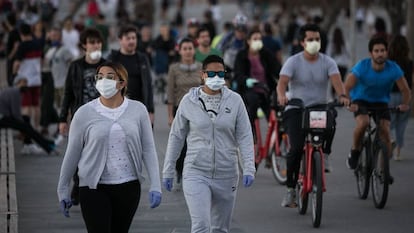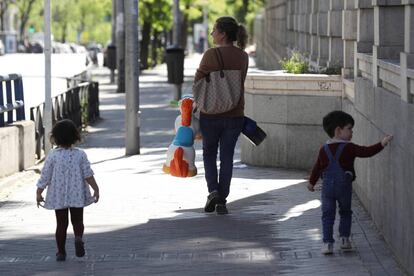All of Spain’s regions request moving to Phase 1 apart from Catalonia and Castilla y León
Madrid wants to relax coronavirus confinement measures, despite having been the worst-hit by the crisis. Densely populated areas such as Barcelona will remain for now in Phase 0


Spain’s regions on Wednesday passed their proposals for the next stage of the deescalation of coronavirus measures to the central Health Ministry, and the majority requested to move from the current Phase 0 to Phase 1 on Monday. This would involve allowing businesses and street cafés to partially reopen, and for members of the public to meet in groups of 10 people or fewer, either in the open air or in private residences. The Health Ministry will have the final say on the next steps.
Four Spanish islands – El Hierro, La Gomera y La Graciosa and Formentera – entered Phase 1 directly on Monday, given the low incidence of the coronavirus on the Canary and Balearic islands. The stage still limits citizens to their own province, but allows them to meet with up to 10 people provided that social distancing is observed. Under the phase, street cafés can open at 50% of usual capacity, outdoor markets at 25% and religious celebrations at 30%. Stores that measure less than 400 square meters can open at 30% of usual capacity.
Madrid, which still has a high rate of cases and has been the Spanish region worst hit by the coronavirus crisis, has requested to move to Phase 1. The decision-making process brought to light differences in the regional administration itself, which is governed by the conservative Popular Party (PP) and center-right Ciudadanos (Citizens).
The request was eventually formulated after a long debate between the regional premier, Isabel Díaz Ayuso of the PP, who had doubts about moving to the next phase, and Ignacio Aguado, the deputy premier from Ciudadanos, who wanted to take the step. A compromise was eventually reached, with the inclusion of masks being obligatory in closed spaces. The hope is that the Health Ministry will approve the request, thus helping to reactivate the Madrid economy.
The central government has established that the deescalation will be carried out by province, although Health Minister Salvador Illa has said he is willing to study other options. Catalonia and Castilla y León, for example, have suggested it be done by healthcare zones.
In contrast to Madrid, Catalonia has opted for a more cautious approach, and has decided to keep its most-populated areas – such as Barcelona, Girona and parts of Lleida – in Phase 0 given the moderate risk of new outbreaks of the virus. It has suggested that three areas move to Phase 1 on Monday. These include the province of Tarragona and part of Lleida (Terres de l’Ebre, Camp de Tarragona and Alt Pirineu i Aran), which are at low risk of an outbreak.
The regional government in Castilla y León has also stuck to healthcare zones in the request sent to Madrid this week. It believes that just 26 of its 247 healthcare areas meet the requirements to move to Phase 1. Segovia, for example, will remain in Phase 0 because none of its hospitals and primary care centers meet the requirements set out by the government. Of the 26 zones that could enter the next phase, one is in Ávila, six in Burgos, three in León, one in Palencia, four in Salamanca, one in Soria, three in Valladolid and seven in Zamora. They are all rural areas with low population levels, and in many of them there have been no coronavirus cases.

Andalusia has suggested that eight of its provinces move to Phase 1, with 30 of the 33 healthcare districts moving to the new phase. The three districts that do not meet the requirements – two in Granada and one in Málaga – will be subject to conditions, such as allowing for basic purchases to be made in stores but no crowds or meetings among groups of people. The regional premier will also request that bathing in the sea be allowed from the earlier date of May 25, something that is included in the last step, Phase 3 of the deescalation plan.
Valencia has requested that the entire region move to Phase 1 on Monday, and has also requested that it be allowed to modify the timetables that govern when people can go out on the street during the day to take exercise, given that warmer weather is fast approaching.
Galicia will request that its entire territory move to Phase 1, stating that the levels of the virus are “very low” in its four provinces and pointing out that 196 municipalities have had no new infections in the last two weeks.
In the Basque Country, health authorities say that the entire region “meets all the requisites to enter the next phase.” These include the capacity of hospitals, the number of intensive care unit beds and a low contagion rate.
The Canary Islands government has sent health, socioeconomic and mobility data about its five islands currently in Phase 0 to the Health Ministry, so that they can pass to Phase 1 on Monday.
In Castilla-La Mancha, the regional government has proposed that all provinces move to Phase 1. Health chief Jesús Fernández Sanz said that the data is “encouraging.” The region has also suggested a change in timetables for walks due to the warm weather, a limit of 30% capacity in museums and libraries, the reopening of hotels but with no common areas, and groups of 10 people for active and nature tourism.
Murcia has requested the entire region move to Phase 1 on May 11, but has not released any details about its deescalation plan. It has just requested a change to the timetables for children to take walks, given the high temperatures.

Aragón has requested that the entire region move to Phase 1 and that several comarcas, as some administrative divisions are known, go directly to Phase 2 so that rural areas can get back to normal. Seventy-six percent of municipalities occupy 73% of the region, and account for just 12% of the population.
The Balearic Island government requested on Tuesday that Mallorca pass to Phase 1, having previously requested the same for Ibiza and Mallorca. The Balearics has seen “a low incidence” of the infection in recent days, with just one new case on Monday and two on Tuesday.
Extremadura has requested that Cáceres and Badajoz move to Phase 1 on May 11. The regional government has sent two reports with data backing the request.
Asturias will request that the entire region move to Phase 1, apart from the Valle del Oso and the Valle de Oscos, which it wants to pass to Phase 2.
Navarre will propose that the entire region move to Phase 1, and has ruled out requesting Phase 2 for some areas. The regional government will, however, study some healthcare areas “to see which of them could move from one phase to the next.”
Cantabria has requested it move to Phase 1, and has also called for the deescalation of 10 additional activities, including the opening of ITV vehicle testing centers and car dealerships, skittles games and recreational fishing. The Cantabrian government wants to boost the reactivation of economic sectors in the region.
La Rioja has requested a move to Phase 1 in the entire territory.
The North African exclave cities of Ceuta and Melilla have asked to move to Phase 1, and also have called for connections with the Iberian peninsula to remain closed.
With reporting by L. J. Varo, J. Cañas, L. Bohórquez, S. Vizoso, E. Saiz, V. Vadillo, E. de Benito, C. Sánchez, P. Linde, Noor Mahtani and M. Ormazabal.
English version by Simon Hunter.
Tu suscripción se está usando en otro dispositivo
¿Quieres añadir otro usuario a tu suscripción?
Si continúas leyendo en este dispositivo, no se podrá leer en el otro.
FlechaTu suscripción se está usando en otro dispositivo y solo puedes acceder a EL PAÍS desde un dispositivo a la vez.
Si quieres compartir tu cuenta, cambia tu suscripción a la modalidad Premium, así podrás añadir otro usuario. Cada uno accederá con su propia cuenta de email, lo que os permitirá personalizar vuestra experiencia en EL PAÍS.
¿Tienes una suscripción de empresa? Accede aquí para contratar más cuentas.
En el caso de no saber quién está usando tu cuenta, te recomendamos cambiar tu contraseña aquí.
Si decides continuar compartiendo tu cuenta, este mensaje se mostrará en tu dispositivo y en el de la otra persona que está usando tu cuenta de forma indefinida, afectando a tu experiencia de lectura. Puedes consultar aquí los términos y condiciones de la suscripción digital.








































